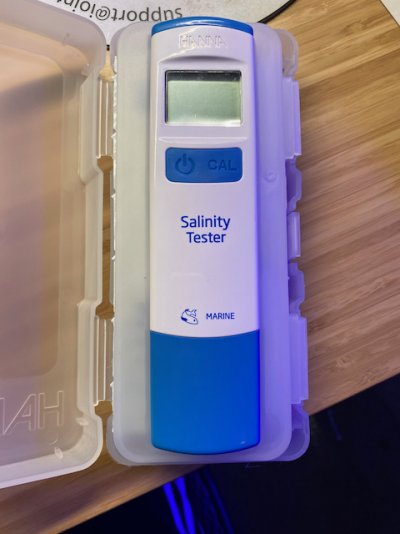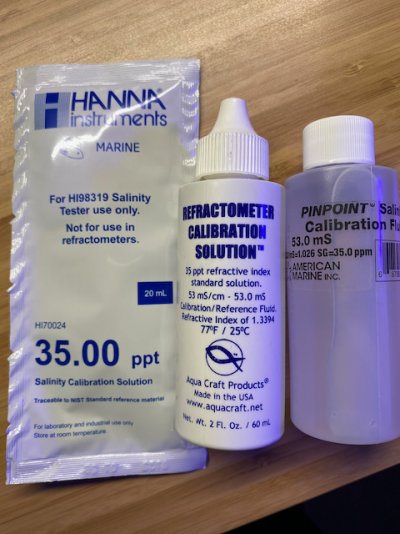I have 2 tanks, both with apex controllers. I also sent out ICP tests and received the results for both tanks. The difference in salinity reading from the apex (compared to each other) and the ICP vary pretty significantly. I do bi-weekly water changes on both tanks from the same mixed source water so I would have expected the salinity to be close to each other but that is not the case.
So I ordered calibration fluid from Pinpoint and Aqua Craft Products. I also ordered a salinity tester from hanna which also came with it's own calibration fluid.
I have used the same refractometer for years and had always just zero'ed it out to my rod water for calibration. I realize now that is probably not the beat way to do it. Anyways I thought I would start by checking the salinity on each calibration fluid with my refracto and was expecting for them to be fairly close to each other in the 35 ppt range.
I was completely surprised at the result
Hanna = 27 ppt
Pinpoint = 38 ppt
Aqua Craft = 42 ppt
I have already calibrated the hanna with the hanna supplied calibration fluid but now I am questioning my result. I would like to calibrate both conductivity probes, Hana checker and refractometer to the same source so I can get very close to the same readings everywhere I look.
What is everyone's opinion on how I should proceed here? I am at a loss at what calibration source to use.


So I ordered calibration fluid from Pinpoint and Aqua Craft Products. I also ordered a salinity tester from hanna which also came with it's own calibration fluid.
I have used the same refractometer for years and had always just zero'ed it out to my rod water for calibration. I realize now that is probably not the beat way to do it. Anyways I thought I would start by checking the salinity on each calibration fluid with my refracto and was expecting for them to be fairly close to each other in the 35 ppt range.
I was completely surprised at the result
Hanna = 27 ppt
Pinpoint = 38 ppt
Aqua Craft = 42 ppt
I have already calibrated the hanna with the hanna supplied calibration fluid but now I am questioning my result. I would like to calibrate both conductivity probes, Hana checker and refractometer to the same source so I can get very close to the same readings everywhere I look.
What is everyone's opinion on how I should proceed here? I am at a loss at what calibration source to use.























